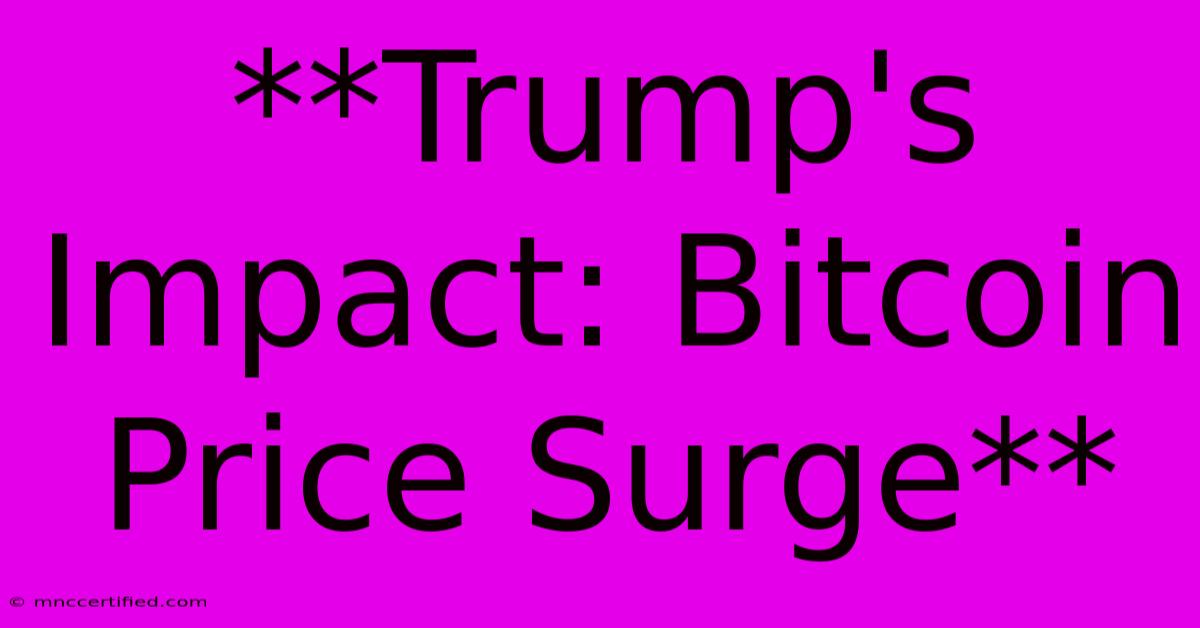**Trump's Impact: Bitcoin Price Surge**

Table of Contents
Trump's Impact: Bitcoin Price Surge
The cryptocurrency market is known for its volatility, but 2020 witnessed a unique phenomenon: a surge in Bitcoin's price, seemingly influenced by the political landscape, specifically the actions of then-President Donald Trump. This article delves into the potential connections between Trump's policies and the unprecedented rise of Bitcoin.
The Political Climate: A Catalyst for Change?
2020 was a year of political upheaval, marked by the COVID-19 pandemic, social unrest, and a heated presidential election. This volatile atmosphere, coupled with a growing distrust in traditional financial systems, propelled investors towards alternative assets like Bitcoin.
Here's how Trump's actions might have fueled the Bitcoin rally:
- Economic Uncertainty: Trump's policies, including trade wars and stimulus packages, created economic uncertainty and inflation concerns. This spurred a search for safe haven assets, with Bitcoin perceived as a hedge against inflation and market instability.
- Devaluation of the Dollar: Trump's unorthodox economic policies, including aggressive monetary easing, led to concerns about the weakening value of the US dollar. Bitcoin, as a decentralized digital currency, presented an alternative to the dollar's potential decline.
- Government Intervention: Trump's rhetoric on regulating cryptocurrency, coupled with his administration's stance on digital currencies, generated both fear and excitement among investors. This uncertainty further fueled the volatile nature of the Bitcoin market.
The Rise of Bitcoin: A Safe Haven in Turbulent Times?
As the political climate intensified, Bitcoin's value soared. The narrative surrounding Bitcoin as a "digital gold," a store of value beyond government control, resonated with investors seeking refuge from economic and political uncertainty. The influx of institutional investors, driven by factors like inflation concerns and diversification strategies, further boosted Bitcoin's price.
However, the correlation between Trump's actions and Bitcoin's surge remains a subject of debate. Other factors that could have contributed to the price increase include:
- Increased adoption: The growing number of individuals and businesses adopting Bitcoin as a payment method and investment tool.
- Halving event: The reduction in Bitcoin's block reward, which led to a decrease in supply and potentially increased its value.
- Technological advancements: Innovations in blockchain technology and the development of new applications for Bitcoin.
Conclusion: A Complex Interplay of Factors
While it's challenging to isolate the impact of any single factor on Bitcoin's price movement, it's clear that the political landscape played a significant role in the cryptocurrency's surge during Trump's presidency. The economic uncertainty, concerns about the dollar's value, and the perception of Bitcoin as a safe haven asset all contributed to its rise.
However, it's essential to acknowledge the complex interplay of factors, including technological advancements, institutional adoption, and market sentiment, that contributed to the overall surge in Bitcoin's price. The future of Bitcoin remains uncertain, but its trajectory in 2020 provides a fascinating glimpse into the potential impact of political events on the cryptocurrency market.
Keywords: Bitcoin, Trump, cryptocurrency, price surge, political climate, economic uncertainty, dollar devaluation, safe haven asset, inflation, institutional investors, technological advancements, adoption, halving event, market sentiment, volatility.

Thank you for visiting our website wich cover about **Trump's Impact: Bitcoin Price Surge**. We hope the information provided has been useful to you. Feel free to contact us if you have any questions or need further assistance. See you next time and dont miss to bookmark.
Featured Posts
-
Detroit Lions Drumline At Percussion Concussion 2024
Nov 07, 2024
-
Rice Injury Chelsea Game Doubt Inter Milan Miss
Nov 07, 2024
-
Cottingham Insurance Bismarck North Dakota
Nov 07, 2024
-
Shetlands Alison O Donnell On Episode 1s Impact
Nov 07, 2024
-
1000 Ethereum Investment 5 Years Ago The Results
Nov 07, 2024